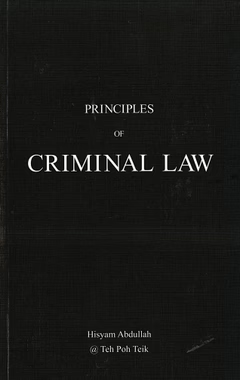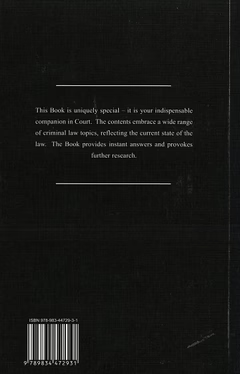Description
This book is an indispensable companion in court for legal practitioners, students, and anyone involved in the criminal justice system. Written by the renowned criminal law expert Hisyam Teh Poh Teik, this comprehensive guide covers a broad spectrum of criminal law topics, reflecting the latest developments and current state of the law. The text is meticulously organized to provide instant answers and practical insights on complex legal issues, making it an invaluable resource for quick reference during court proceedings.
Principles of Criminal Law not only addresses the foundational principles but also delves into nuanced and contemporary issues, offering clear explanations and thought-provoking commentary. It is designed to support further research with its detailed analysis and citations of relevant case law, statutes, and legal precedents. Whether you are preparing for a trial, drafting submissions, or studying criminal law, this book equips you with the essential knowledge and tools to navigate the complexities of the legal landscape effectively.
Contents:
A
1. ABETMENT
2. ABUSE OF POWER
3. ABUSE OF PROCESS
4. ACCOMPLICE
5. ACCUSED
6. ADJOURNMENT
7. AFTERTHOUGHT
8. AGENT PROVOCATEUR
9. ALIBI
10. APPEALS
11. APPELLATE INTERVENTION
12. ARREST
B
13. BAIL
14. BARE DENIAL
15. BREACH OF RULES OF NATURAL JUSTICE
C
16. CHARGES
17. CHEATING
18. COMMON INTENTION
19. CONCURRENT FINDINGS
20. CONDUCT
21. CONVICTIONS
22. CORRUPTION
23. COURT
24. CRIMINAL BREACH OF TRUST
25. CROSS-EXAMINATION
26. CUSTODY AND CONTROL
27. THE CHEMIST’S EVIDENCE
D
28. DANGEROUS AND RECKLESS DRIVING
29. DE FACTO DIRECTOR
30. DEFENCES
31. DEMANOUR
32. DISCHARGE UNDER S.254(3) OF THE CRIMINAL PROCEDURE CODE
33. DISCLOSURE
34. DISCRETION
35. DNA EVIDENCE
36. DOUBLE JEOPARDY
E
37. ENGLISH LAWS AND THE CRIMINAL PROCEDURE CODE
38. EQUALITY BEFORE THE LAW
39. ESTOPPEL
40. EVIDENCE
F
41. FAIR TRIAL AND FAIRNESS
42. FIRST INFORMATION REPORT
G
43. GAPS IN THE PROSECUTION’S CASE
44. GENARALIBUS SPECIALIA DEROGANT
45. GRAVE AND SUDDEN PROVOCATION
H
46. HABEAS CORPUS
47. HEARSAY
48. HOSTILE WITNESS
I
49. IDENTIFICATION PARADE
50. IMPEACHMENT OF WITNESS
51. INCOMPETENCY OF COUNSEL
52. INCOMPETENT APPEALS
53. INFERENCE
54. INNOCENT CARRIER
55. INQUEST PROCEEDINGS
56. INSANITY
57. INTERESTED WITNESS
58. INTERFERENCE BY JUDGE AND S.165 OF THE EVIDENCE ACT
59. INTERPRETATION OF PENAL STATUTE
60. INVESTIGATION
J
61. JUDGES AND JUDGMENTS
62. JUDICIAL NOTICE
63. JUDICIAL REVIEW
K
64. KNOWLEDGE
L
65. LAST SEEN TOGETHER THEORY
66. LOCUS STANDI
M
67. CHANGE OF MAGISTRATE AND SECTION 261 OF THE CRIMINAL PROCEDURE CODE
68. MOTIVE
69. “MANUFACTURING” UNDER S.2 OF THE DANGEROUS DRUGS ACT 1952
70. MISCARRIAGE OF JUSTICE
71. MISDIRECTION
N
72. NULLUM CRIMEN SINE LEGE, NULLA POENA SINE LEGE
O
73. OBSCENITY
74. OMISSION TO ACT
75. OPENING ADDRESS
76. OPPORTUNITY TO COMMIT CRIME
77. OVERT ACT
P
78. POLCE WITNESSES
79. POSSESION
80. PREJUDICIAL EVIDENCE
81. PRESUMPTIONS
82. PRIMA FACIE CASE
83. PRIVATE DEFENCE
84. PROSECUTION
Q
85. QUANTITY OF DRUGS
R
86. RADHI DIRECTION
87. REASONABLE DOUBT
88. REFRESHING MEMORY
89. REMAND PROCEEDINGS
90. RE-OPENING OF CONCESSION OF FACTS MADE BY DEFENCE AT THE APPELATE STAGE
91. RETIRAL
92. RETROSPECTIVE LEGISLATION AND ART.7 OF THE CONSTITUTION
93. REVISIONARY POWERS AND S.323 OF THE CRIMINAL PROCEDURE CODE
S
94. SEARCH LIST
95. SECTION 4 OF POCA (PREVENTION OF CRIME ACT 1959)
96. SECTION 51A OF THE CRIMINAL PROCEDURE CODE
97. SECTION 422 & SECTION 156 OF THE CRIMINAL PROCEDURE CODE
98. “SELLING” AND “ACTUAL DELIVERY” UNDER SECTION 2 OF THE DANGEROUS DRUGS ACT 1952
99. SENTENCING
100. SILENCE
101. SIMILAR FACT EVIDENCE
102. STAY OF CRIMINAL PROCEEDINGS
103. STAY OF EXECUTION
104. SUBMISSION
105. SUDDEN FIGHT
T
106. TRIAL
107. THE TURNBULL GUIDELINES
U
108. UNFIT TO PLEAD
109. UNSWORN STATMENT
V
110. VICARIOUS LIABILITY
W
111. WAIVER
112. WARRANT OF ARREST
113. WILLFUL BLINDNESS
114. WITNESS
Y
115. YOUNG OFFENDERS
Forward:
The principles of criminal law serve as the lifeblood of a fair and robust criminal justice system that safeguards the rights of the accused whilst protecting society’s interests. Therefore, a firm grasp of the fundamental principles of criminal law is crucial to ensure that the law is applied appropriately, fairly, and impartially. In this context, I welcome this publication and commend and congratulate the author for his considerable effort and hard work in bringing this book to print.
This book presents and compiles relevant principles of criminal law derived from judicial decisions on various topics and issues. The topics and issues are arranged alphabetically to facilitate easy and quick reference. In addition, the compilation provided in this book allows readers to save time on tedious research.
This book is not just an essential resource for anyone involved in criminal justice administration; it is also a valuable resource for the broader community since ensuring justice is served to all requires a better understanding of criminal law principles. I wish the author and this book all the best.
Tun Tengku Maimun binti Tuan Mat
Chief Justice of Malaysia
July 2024
If you wou’d not be forgotten,
As soon as you are dead and rotten,
Either write things worth reading,
Or do things worth the writing.
Benjamin Franklin, in Poor Richard’s Almanack 1738
Authored by a prominent criminal litigator, this book entitled “Principles of Criminal Law” is what Benjamin Franklin would envision to be the “things worth reading”, and “worth the writing”. As an important branch of public law, Malaysian criminal law has developed so much in several aspects. Judicial pronouncements on preventive detention and ouster clause; and sentencing principles of capital punishment are among the major legal changes that took place in the recent past, that had altered our legal landscape in no small measure.
Having browsed through the draft copy of the book, I found it as an easy reference, covering all major aspects of criminal law matters, including the latest judicial decisions. Arranged alphabetically, I noticed that the book provides a different way of presenting the topics, highlighting only the relevant part of the judgment that encapsulates the essence of the judicial reasoning. That creative approach will surely lead the reader directly to the excerpts relevant to the issue in question that requires a quick enlightenment.
I have no doubt that this book will be a convenient and reliable source of information on criminal law considering that the author has also written earlier publications on, inter alia, drug trafficking and possession, money laundering and criminal trial advocacy for the defence.
For his untiring dedication and hard work in coming out with this invaluable publication, I wish to congratulate the learned author, Datuk Hisyam Abdullah @ Teh Poh Telk. I also wish to thank him for the contributions that he has made in enriching our collection of legal literature. May this book and its author find the success they both deserve. -*
Tan Sri Datuk Amar Abang Iskandar bin Abang Hashim
President, Court of Appeal, Malaysia
Putrajaya
I am very pleased to be invited to write the Foreword for this book authored by Datuk Hisyam Teh Poh Telk. I express my gratitude for this invitation.
This work makes a substantial contribution to criminal law, presenting a plethora of authorities that exemplify its fundamental principles. His meticulous research and extensive legal expertise are evident throughout the pages of this book. His ability to distill complex legal doctrines into clear and concise explanations makes this an invaluable resource for legal practitioners, prosecutors, and judges alike. This book not only elucidates the theoretical underpinnings of criminal law but also provides practical insights that are crucial for understanding and navigating the challenges in criminal practice.
One of the remarkable strengths of this book is its comprehensive coverage of both classical and contemporary issues in criminal law. His scholarly rigor is matched by a lucid writing style, ensuring that readers can engage with and appreciate the nuances of criminal law.
I would like to warmly congratulate Datuk Hisyam Teh Poh Teik on his initiative in bringing together a great number of relevant and useful legal
principles on criminal law. Lastly, I heartily wish this book a great success.*-
Tan Sri Dato’ Abdul Rahman bin Sebli
Chief Judge of Sabah and Sarawak
It is both a pleasure and an honour to pen the foreword for Principles of Criminal Law, a seminal work by the esteemed Datuk Hj Hisyam Teh Poh Teik. This book emerges at a pivotal moment in the evolution of criminal justice, where the interplay between traditional doctrines and contemporary challenges necessitates a nuanced and sophisticated understanding.
As a judge. I have had the privilege of witnessing the dynamic interplay of law and society. The principles that govern criminal law are the bedrock of our legal system, ensuring justice, fairness, and order. Datuk Hj Hisyam Teh Poh Teik has masterfully captured these principles, weaving them into a comprehensive guide that is as informative as it is enlightening. Credit is due to him for the exhaustive and scholarly effort invested in completing the Principles of Criminal Law, with a discerning and critical eye, as he has analysed, extracted and compiled relevant principles of criminal law from the myriad judicial decisions of the Malaysian superior courts.
Principles of Criminal Law serves as a compendium meticulously collates and analyses pivotal cases and doctrines that shape the criminal law landscape. Organised into 24 curated alphabetical chapters and 427 pages, each chapter encompasses an array of topics-from the principles of appellate intervention, last seen together theory, sentencing. and other procedural intricacies. The cases are carefully selected to provide a comprehensive understanding of the practical application of theoretical principles, ensuring that readers gain both doctrinal knowledge and insights into the judicial reasoning process.
I wholeheartedly recommend Principles of Criminal Law to anyone seeking valuable guidance through the complexities of criminal jurisprudence. The compendium not only covers well-
established legal precedents but also incorporates recent and evolving interpretations, reflecting the dynamic nature of criminal law
It is with admiration that I extend my congratulations to Datuk Hj Hisyam Teh Poh Teik on this excellent contribution to legal literature. His dedication to the field, scholarly acumen
and passion for justice are manifest in this work, which stands as his fifth publication. I trust this book will become a cornerstone in the study and practice of criminal law, benefiting future generations of legal professionals, scholars, and advocates in Malaysia.*-
Tan Sri Datuk Nallini Pathmanathan
Judge of the Federal Court of Malaysia
08 August 2024
About the Author:
Hisyam Teh Poh Teik is a renowned Malaysian criminal defense lawyer celebrated for his extensive legal expertise, meticulous approach, and formidable advocacy skills. A Lincoln’s Inn graduate, Hisyam has represented clients in numerous high-profile criminal cases across all levels of the judiciary, including the Federal Court of Malaysia.
In addition to his courtroom achievements, Hisyam is a prolific author and respected educator, making significant contributions to the legal field through his writings. His notable publications include Principles of Criminal Law, Civil Defence, and Drug Trafficking: Criminal Law and Procedure. These works are widely recognized for their clarity, practical insights, and comprehensive analysis, making them essential resources for legal practitioners, students, and anyone involved in the criminal justice system. Hisyam’s books are invaluable for their ability to distill complex legal concepts into accessible guidance, supporting the pursuit of justice and legal excellence.



Reviews
There are no reviews yet.